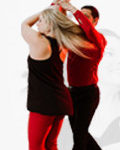Like all dances, WCS is composed of several fundamental patterns. Unlike many other dances, west coast patterns can extend or break the “rules” that make the fundamental patterns work. This gives WCS an amazing degree of flexibility but also increases the chances of moves not working on the social floor.
To understand why some moves work well no matter who you’re dancing with and some moves seem liable to break, Mario Robau, Jr. divides patterns into three categories.
Beginner Patterns
There are basically 3 types of beginner patterns that all west coast swing moves are based from. Pushes, Passes & Whips. They are the core 6 & 8 count patterns in WCS. You can learn all of the basics of west coast swing here.
Social patterns
Social can be followed by anyone who knows their WCS basics, even if they haven’t seen the specific pattern before. Social patterns work because they keep the same pattern rules, timing, and connection as the fundamental WCS moves. A push break with a tuck, a left side inside roll, and a whip with a single turn are all examples of social patterns.
Workshop patterns
Workshop patterns are lead- and follow-able, but only if the dancers have learned the pattern previously. These patterns may syncopate the rhythm of the dance, change the connection, or otherwise break from the fundamental WCS structure. The hip catch, which syncopates the follower’s footwork, and the rock-and-go, which messes with the connection and footwork of the anchor, are examples of workshop patterns.
Choreographed patterns
Choreographed patterns require both the leader and follower to be on the same page for the move before it even begins. These patterns aren’t “leadable” or “followable” in the traditional sense. If the partners have practiced the move then they may be able to make it look like they are responding to each other, but these moves have no chance of succeeding if both partners aren’t planning the move in advance.
The next time you are out social dancing, pay attention to the kinds of patterns you dance.
For leaders:
- What is the breakdown of your pattern selection? Are you 80 social/20 workshop/0 choreographed, 50/30/20, 20/70/10?
- Which kinds of patterns result in errors, on either side of the dance?
For followers:
- Notice the breakdown of patterns in your leaders. Which leaders lead predominantly social patterns? Workshop patterns? Choreographed patterns?
- Which kinds of patterns result in errors, regardless of who made the error?
If you actually try this exercise, you’ll probably notice that social patterns result in few, if any, mistakes, whereas workshop and choreographed patterns are higher-risk. If you compete, this is important information. If you want to be able to social dance with anyone, this is important information. The bottom line is: learning how to dance within your social patterns—and that includes doing your musicality and styling within those patterns—will enable you to dance much better, much more consistently, no matter who you draw or ask to dance. If you’re wondering how to get good at west coast swing, this website is the place to start!



 Brian & Megan
Brian & Megan